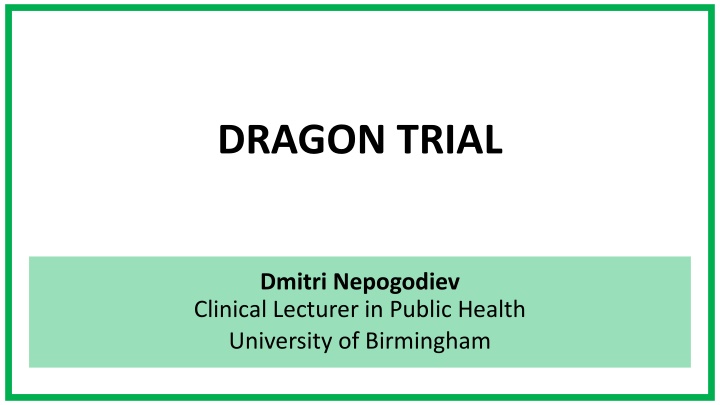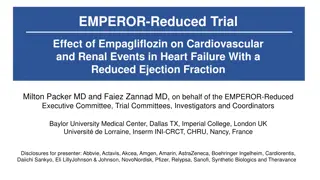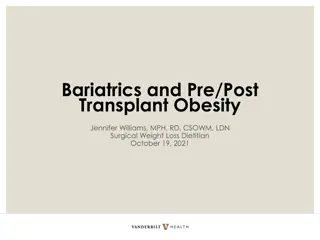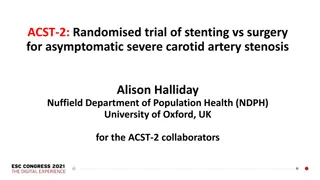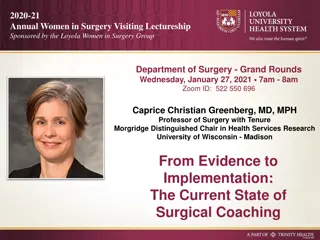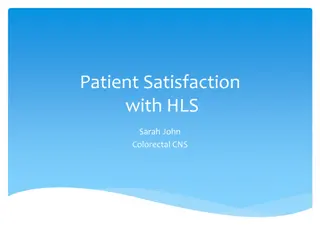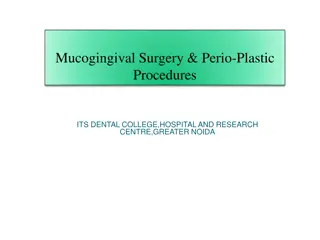DRAGON Trial: Green Surgery Research Programme Overview
Dmitri Nepogodiev, a Clinical Lecturer in Public Health at the University of Birmingham, leads the DRAGON Trial aiming to compare the effectiveness and sustainability of reusable versus single-use drapes and gowns in surgical settings. With a focus on reducing surgical site infections, carbon footprint, and costs, the trial involves a cluster-randomised approach across multiple hospitals. The methodology includes streamlined processes and a large sample size to ensure robust outcomes. This initiative is part of a broader effort towards cleaner and more sustainable practices in healthcare.
Download Presentation

Please find below an Image/Link to download the presentation.
The content on the website is provided AS IS for your information and personal use only. It may not be sold, licensed, or shared on other websites without obtaining consent from the author.If you encounter any issues during the download, it is possible that the publisher has removed the file from their server.
You are allowed to download the files provided on this website for personal or commercial use, subject to the condition that they are used lawfully. All files are the property of their respective owners.
The content on the website is provided AS IS for your information and personal use only. It may not be sold, licensed, or shared on other websites without obtaining consent from the author.
E N D
Presentation Transcript
DRAGON TRIAL Dmitri Nepogodiev Clinical Lecturer in Public Health University of Birmingham
Wider green surgery programme Background Starting point Successful colorectal surgery research group with clinical trials expertise COVID-19 Developed global pan-specialty surgical network as a research response to the pandemic Post-pandemic Aim to leverage network to tackle cross-cutting post-pandemic challenges Green surgery research programme Anaesthesia Initiatives to reduce nitrous oxide DRAGON Cluster-randomised trial testing reusable versus single-use theatre drapes and gowns Progress update Conference 290 people attended inaugural Research for Greener Surgery Conference in Dec 2023 DRAGON Protocol submitted to NHS ethics Modelling Carbon model completed to evaluate routine glove change (CHEETAH trial)
Reusable drapes and gowns Both single-use and reusable drapes and gowns are in widespread use globally. There is no robust evidence to guide choice of single-use versus reusable drapes and gowns. No World Health Organisation recommendation. Single-use drapes and gowns may be associated with lower SSI rates, but also likely to have higher financial and carbon costs. DRAGON trial objectives: Determine whether there is difference in SSI with reusable versus disposable drapes & gowns. Identify the most sustainable and cost-effective option. We will report clinical, cost, carbon outcomes in an integrated results paper (world-first).
A cluster randomised trial Cluster randomised trials randomise units rather than individual patients. DRAGON will randomise hospitals to single-use versus re-usable drapes and gowns. As the intervention is delivered at hospital-level, patient consent is not required for the intervention. Essential to ensure that all consecutive eligible patients are enrolled and receive the randomised allocation. The Intra-operative Case Report Form should be completed for all patients as a check for eligibility.
Statistics and trial processes Sample size: 12.5% baseline SSI rate with 2.5% non-inferiority margin, 90% power. 26,800 patients; 134 hospitals (200 patients per hospital). Streamlined trial processes: Waiver for patient consent. Two case report forms (intraoperative and 30-day follow-up) only. Telephone follow-up.
Energy in the UK Over half the carbon emissions of NHS hospitals are from building energy use (2,351 ktCO2 annual). 473 ktCO2 could be reduced by upgrading buildings (e.g. air conditioning, LEDs). 580 ktCO2 by on-site renewable energy (solar) and heat generation (heat pumps). Reducing energy use and decarbonising energy supply are complementary and both necessary. The NHS signalled its commitment to decarbonising energy by transitioning to purchasing 100% renewable energy from April 2021. Renewables accounted for 47.3% of total electricity generation in the UK in 2023. Purchasing renewable energy from the national grid does not provide additionality. UK marginal cost pricing system means that electricity price based on cost of fossil fuels. The cost of solar energy generation decreased 92% in 2009-2021 Solar could reduce NHS energy bills, with savings spent on initiatives for patient benefit.
Living toolkit Purpose of living toolkit is to share learning from successful schemes to accelerate implementation of clean energy initiatives across the NHS. It will contain key documents (standard operating procedures, business plans, etc). Toolkit to support public engagement. It will be freely available online with documents that can be easily adapted. Be updated quickly and efficiently.
